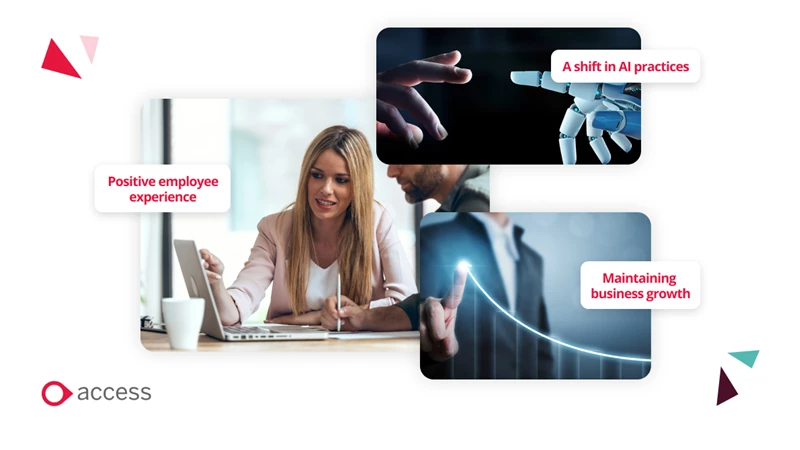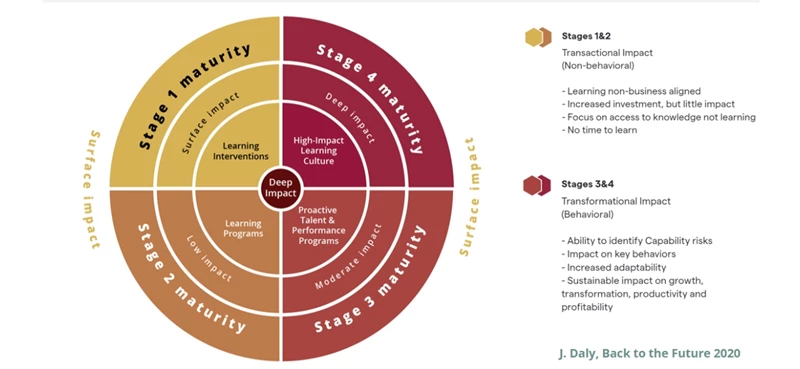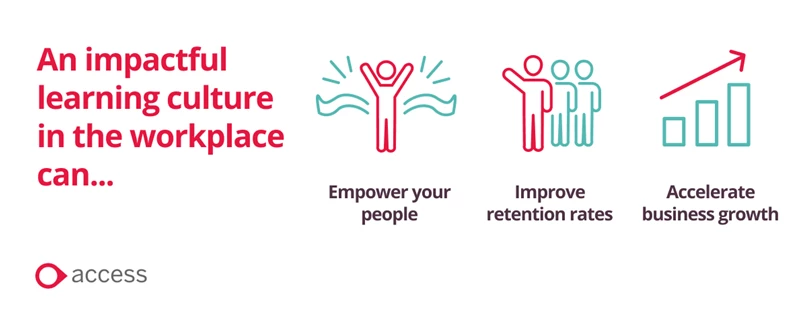How to create an impactful learning culture in the workplace
Are you interested in learning more about the Learning and Development maturity model and the impact of your organisations’ L&D maturity on learning culture? Perhaps you're wondering where to focus your plans and investments in L&D to achieve your business objectives?
Look no further, as this informative blog is designed to help you do just that.

Understanding the L&D Maturity Model and business impact in 2024
In this blog, Sarah Mian, our Head of Learning Content for Access Learning provides you with valuable insights on the different stages of the L&D maturity model. We'll also explore the benefits of building up through these stages to create a continuous learning culture in the workplace.
In this blog you’ll get valuable insights to help you make informed decisions about where to focus your L&D plans to create a strong learning culture at work, helping you achieve your business objectives and stay ahead of the competition.
Setting the scene of L&D in 2024
Businesses are under strain right now. While the economy is growing, it’s at a much slower rate than previously anticipated, as the BBC recently reported. This adds to an ongoing talent crisis, skills shortages, and the ever-present challenges associated with hybrid work.
Leaders have gone into 2024 with the challenges of:
-
- technological upheaval and a shift in AI practices
- ensuring that their workforce enjoys a positive employee experience
- maintaining business growth
When it comes to learning and development, leaders cannot afford to take their foot off the gas. Approaches to professional development should continue to evolve within organisations, aligning priorities with the challenges that lie ahead in the business and economic landscape.
Leaders should prioritise impactful learning in 2024, creating a continuous learning culture that puts learning for professional and personal growth first.

What is L&D maturity and what is learning culture?
L&D Maturity
L&D maturity is a measure of an organisation's level of effectiveness in developing and supporting its employees' learning and growth. It's assessed using a maturity model that categorises an organisation into different stages based on its learning and development practices.
Learning Culture at Work
So, what is learning culture? And what is a learning culture in the workplace?
A learning culture is an ethos that encourages and cultivates learning and development. A learning culture in the workplace is simply applying this to an organisational environment.
By investing in the development of your employees, not only will they benefit, but your organisation will also experience tangible results. Moreover, a culture of learning will motivate your workforce to pursue further learning opportunities beyond the mandatory training they may perceive as merely fulfilling a requirement.
The development of an organisational learning culture is closely linked to the L&D Maturity model. Organisations that are at the mature stage of the L&D Maturity model are more likely to have a strong learning culture.
The L&D Maturity model can serve as a guide for organisations to assess their level of maturity in learning and development and work towards developing a strong learning culture.
The current state of play: A lack of learning maturity
Creating an impactful culture of learning is all about ensuring that employees are getting the maximum possible benefit from any learning tools they access. This can be demonstrated through Jane Daly’s Learning Maturity Model, which offers a visual demonstration of the culture surrounding an organisation’s learning and development practices and beliefs.
Stage 1 & 2
Transactional Impact (Non-behavioral)
-
- Learning non-business aligned
- Increased investment, but little impact
- Focus in access to knowledge not learning
- No time to learn
Stages 3 & 4
Transformational Impact (Behavioral)
-
- Ability to identify Capability risks
- Impact on key behaviours
- Increased adaptability
- Sustainable impact on growth, transformation, productivity and profitability
Organisations that are in the first two stages of learning in the L&D maturity model will see very little impact from the learning and development interventions or programmes they have implemented. Employees in these organisations may have access to knowledge but aren’t truly learning as the interventions are usually transactional and not aligned to business objectives.
Many organisations struggle to surpass stage one of learning maturity, which can lead to skills gaps and issues with retention. This is especially problematic within the current financial climate, as businesses need to leverage every resource possible to encourage growth.

Progressing Your Learning Maturity - going beyond surface impact
Numerous barriers impede organisations from moving towards stages three and four of learning maturity. These stages occur when learning is transformational within an organisation; that’s to say that it has a significant impact on:
-
- Growth
- Transformation
- Productivity
- Profitability
Accessing these stages requires a shift from learning that has a surface impact to learning that has a deep impact.
For learning to have a deep impact within an organisation, leaders must diversify their learning approaches and incorporate both formal eLearning courses, such as Governance, Risk and Compliance, and informal training.
Employees should be empowered to seek out learning opportunities which are personalised and self directed and, driven by employees’ intrinsic motivation to grow rather than extrinsic mandates from management. It is only when we empower this self directed learning approach do we unlock the full benefits of having a high-impact learning culture in the workplace. Furthermore, by recognising that much learning happens outside of formal learning we combat the perception of lack of time which employees regularly report as a barrier to learning.
The journey through L&D maturity for an Effective Culture of Learning
An integrated Learning Management System (LMS) coupled with relevant and engaging content is great for that formal, managed learning. It ensures that the right people are doing the right learning at the right time and provides the foundation to creating a learning culture. However, this should be built upon with opportunities to carry out personalised and self directed learning alongside managed learning.
When content is personalised to your skills or directed by your own interests the motivation to learn is high and this drives engagement and daily interaction. By integrating content with social tools, you amplify the learning further, opening up the possibilities of learning from each other.
“It is only when you validate and encourage all types of learning, formal and informal, that you create a continuous learning culture.”
Ultimately, creating an impactful learning culture in the workplace is a process of normalising learning as part of employees’ everyday flow of work. Not only is this more convenient for the employee, but it is often more engaging, as the employee is driven by the opportunity to reach their potential.
In doing so, organisations can:
-
- empower their people
- improve retention rates
- accelerate business growth

Access Learning – all you need to create a continuous learning culture in the workplace
Access Learning provides digital learning solutions across the full breadth and depth of business learning needs, with options for all business sizes and industries.
LMS and eLearning course library
Using a Learning Management System and eLearning course library includes the means to provide, track and manage all compulsory training around compliance, cybersecurity, health and safety and any other course that you need your employees to complete, such as Mental Health and Wellbeing.
Career Development
Access Career Development content provides individuals with highly personalised learning plans tailored specifically to them, enabling employees to focus on the highest priority areas to become the best version of themselves. Configured in line with your company values, expected behaviours and competencies, the platform can be tailored to different cohorts in your organisation, helping to increase engagement and continue to grow your culture of learning and development.
Self Directed learning
In order to fully allow your employees to elevate and build expertise in areas of interest, Self Directed Learning gives them access to a wide breadth of resources created and delivered by subject matter experts.



